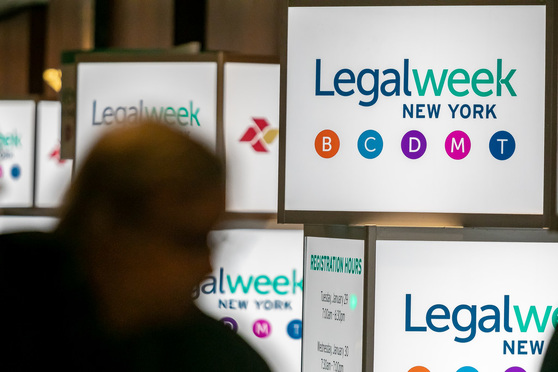LTN's Key Takeaways From Legalweek New York 2020: Day 3
The final day of Legalweek New York 2020 brought discussion to age-old legal questions, and raised some new ones about the future of the industry.
February 06, 2020 at 04:52 PM
5 minute read
The original version of this story was published on Legal Tech News

Missed our Day 2 insights? Check out yesterday's post here.
Rhys Dipshan: Discussions around new technology or services leading to fewer legal jobs always gets the most attention. Which makes sense—everyone is looking after their bottom line. But disruption in the legal industry doesn't have to mean bad change. The industry, after all, is rife with inefficiencies and service gaps.
The ALSPs and tech providers I spoke with over the past few days stressed time and time again how they aren't looking to take away anyone's job. Instead, they're looking to address pain points, such as the rote manual tasks, that can often slow down law firms and legal departments. Such providers see themselves as natural partners to existing legal teams, and as a vital part of a broad ecosystem where there's more than enough room for all to thrive.
This may be true in today's market. But if ALSPs start to take on more complex legal work, and if the lines between law firm and legal service begin to blur (not in the least because of changes in law firm ownership rules), is such an ecosystem sustainable? At what point, if any, do the delineations between the different parts of the legal market start to vanish, especially as law firms become legal tech developers, and vice versa?
Victoria Hudgins: As this year's Legalweek came to a close, it's always interesting to see which panel has a big turnout. I like to think I can gauge which topic is of interest to Legaltech readers. But sometimes I'm 20 minutes into a panel and half the seats are empty while other panels are packed to capacity. It can be a mixed bag.
This year, to my pleasant surprise, a Legal Business Strategy panel discussion regarding GCs seeking diverse outside counsel had a decent turnout. The room wasn't filled to the brim, but there was an active discussion among the panelists and audience to improve opportunities for diverse attorneys.
However, the California Consumer Privacy Act panel I attended was packed, with many in the crowd jotting down or jabbing notes into their cellphone or laptop. Obviously, the one-month-old data privacy law has captured lawyers' attention.
The varying panel attendance reminded me that new regulations and their impact on a lawyer's practice is always top of mind. But lawyers are also receptive to hearing about potential solutions to one of legal's age-old challenges.
Frank Ready: Here we are at the last day of Legalweek, a period that—for me at least—has been filled with many conversations about privacy and the hurdles facing law firms attempting to build or implement their own tech. The privacy chats in particular were interesting and aligned with many conversations that I've had with lawyers and legal technologists over the course of the last year. These conversations mainly focus on evolving technology and laws (hello General Data Protection Regulation) that either conflict or have yet to fully evolve.
I'm not sure that I'll be singing a different tune at the end of Legalweek 2021, as the desire to remain competitive with technologies such as AI is countered by a deepening commitment to the protection of the personal information and data necessary to fuel the growth of that technology. Unless a national U.S. privacy law is enacted within the next 365-days, it doesn't seem like a conversation we're ready to have.
Zach Warren: As I'm sitting here at JFK Airport and reflecting on my experience, one word that I heard a few times today keeps coming to mind: energy. It seems that many Legalweek attendees this year felt energized about tech's prospect for the future, for the new innovations popping up left and right, for meeting the other people also attending this week's show. People roaming the exhibit hall seemed more eager to ask questions, and those on the vendor side seemed jazzed to be giving answers. On the whole, there was an air of excitement.
To me, every legal tech conference is a great legal tech conference since I get to catch up with some friends and make others. But I don't always leave feeling energized—not at every Legalweek, and not at every conference. It's a fun feeling going back with not only new ideas, but a renewed passion that the law truly can be pushed forward in a way that benefits all. Especially as I've long said that Legalweek sets the tone for the first half of the year, I'm optimistic that there will be big things ahead for the legal technology industry and for law as a whole. I hope all of our readers feel the same.
This content has been archived. It is available through our partners, LexisNexis® and Bloomberg Law.
To view this content, please continue to their sites.
Not a Lexis Subscriber?
Subscribe Now
Not a Bloomberg Law Subscriber?
Subscribe Now
NOT FOR REPRINT
© 2025 ALM Global, LLC, All Rights Reserved. Request academic re-use from www.copyright.com. All other uses, submit a request to [email protected]. For more information visit Asset & Logo Licensing.
You Might Like
View All
Law Firms Look to Gen Z for AI Skills, as 'Data Becomes the Oil of Legal'

Law Firms Expand Scope of Immigration Expertise Amid Blitz of Trump Orders
6 minute read
Latest Boutique Combination in Florida Continues Am Law 200 Merger Activity
3 minute read
Incoming Howard University Law Professor Kiah Duggins Among DC Plane Crash Victims
Trending Stories
- 1Uber Files RICO Suit Against Plaintiff-Side Firms Alleging Fraudulent Injury Claims
- 2The Law Firm Disrupted: Scrutinizing the Elephant More Than the Mouse
- 3Inherent Diminished Value Damages Unavailable to 3rd-Party Claimants, Court Says
- 4Pa. Defense Firm Sued by Client Over Ex-Eagles Player's $43.5M Med Mal Win
- 5Losses Mount at Morris Manning, but Departing Ex-Chair Stays Bullish About His Old Firm's Future
Who Got The Work
J. Brugh Lower of Gibbons has entered an appearance for industrial equipment supplier Devco Corporation in a pending trademark infringement lawsuit. The suit, accusing the defendant of selling knock-off Graco products, was filed Dec. 18 in New Jersey District Court by Rivkin Radler on behalf of Graco Inc. and Graco Minnesota. The case, assigned to U.S. District Judge Zahid N. Quraishi, is 3:24-cv-11294, Graco Inc. et al v. Devco Corporation.
Who Got The Work
Rebecca Maller-Stein and Kent A. Yalowitz of Arnold & Porter Kaye Scholer have entered their appearances for Hanaco Venture Capital and its executives, Lior Prosor and David Frankel, in a pending securities lawsuit. The action, filed on Dec. 24 in New York Southern District Court by Zell, Aron & Co. on behalf of Goldeneye Advisors, accuses the defendants of negligently and fraudulently managing the plaintiff's $1 million investment. The case, assigned to U.S. District Judge Vernon S. Broderick, is 1:24-cv-09918, Goldeneye Advisors, LLC v. Hanaco Venture Capital, Ltd. et al.
Who Got The Work
Attorneys from A&O Shearman has stepped in as defense counsel for Toronto-Dominion Bank and other defendants in a pending securities class action. The suit, filed Dec. 11 in New York Southern District Court by Bleichmar Fonti & Auld, accuses the defendants of concealing the bank's 'pervasive' deficiencies in regards to its compliance with the Bank Secrecy Act and the quality of its anti-money laundering controls. The case, assigned to U.S. District Judge Arun Subramanian, is 1:24-cv-09445, Gonzalez v. The Toronto-Dominion Bank et al.
Who Got The Work
Crown Castle International, a Pennsylvania company providing shared communications infrastructure, has turned to Luke D. Wolf of Gordon Rees Scully Mansukhani to fend off a pending breach-of-contract lawsuit. The court action, filed Nov. 25 in Michigan Eastern District Court by Hooper Hathaway PC on behalf of The Town Residences LLC, accuses Crown Castle of failing to transfer approximately $30,000 in utility payments from T-Mobile in breach of a roof-top lease and assignment agreement. The case, assigned to U.S. District Judge Susan K. Declercq, is 2:24-cv-13131, The Town Residences LLC v. T-Mobile US, Inc. et al.
Who Got The Work
Wilfred P. Coronato and Daniel M. Schwartz of McCarter & English have stepped in as defense counsel to Electrolux Home Products Inc. in a pending product liability lawsuit. The court action, filed Nov. 26 in New York Eastern District Court by Poulos Lopiccolo PC and Nagel Rice LLP on behalf of David Stern, alleges that the defendant's refrigerators’ drawers and shelving repeatedly break and fall apart within months after purchase. The case, assigned to U.S. District Judge Joan M. Azrack, is 2:24-cv-08204, Stern v. Electrolux Home Products, Inc.
Featured Firms
Law Offices of Gary Martin Hays & Associates, P.C.
(470) 294-1674
Law Offices of Mark E. Salomone
(857) 444-6468
Smith & Hassler
(713) 739-1250








